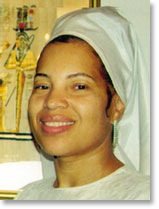FCNNEWSSOURCE

When her marriage faltered, Nisa Islam Muhammad did not give in or cop out. Instead, she channeled her anger and forged a foundation of good ethics, relationships, spirituality, and family. In March 2003, she co-founded the Wedded Bliss Foundation and Black Marriage Day in an effort to reverse the negative stereotypes of Black marriages and help preserve the institution.
Charlene Muhammad (CM): How did you get started in this?

Nisa Islam Muhammad (NM): I had completed a tour of duty in the military of the Nation of Islam. Minister Farrakhan taught me how to serve Black people so I needed something to do. While working on an article for The Final Call newspaper, I discovered that married Black men make more money. I thought, “This can’t be true.” I did more research and found that it was true and there were numerous benefits to being married. I asked myself, “Does anybody Black know this?”
I went looking for a group that promoted marriage to the Black community and couldn’t find one, so I started Wedded Bliss Foundation. I’m trying to start a revolution for love to change the hearts and minds in the Black community to reconsider marriage.
CM: As other institutions–economic, health, education, etc.–dismantle, how have Black marriages fared, in your observation?
NM: Our marriages are in serious trouble regardless of income, education, background and a host of other factors. Right after slavery, when we could barely do more than jump over a broom, we had the highest marriage rate in the country. Now, with more education, money and means of communication, we can’t stay together. We’ve disconnected marriage from childbearing. Not only are our lives suffering from our poor decisions, but our children’s lives are suffering, as well.
CM: How has the same-sex marriage campaigns affected “traditional marriages” in the Black community?
NM: Wedded Bliss Foundation follows the guidance of God, that marriage is between a man and a woman. I don’t think these recent campaigns have affected Black marriages because our marriages have been headed for trouble since the 1960s.
CM: What are your goals for next year?
NM: I want to increase the number of cities that not only celebrate Black Marriage Day, but also develop programs and services to strengthen marriage in their communities. We usually don’t get the help we need for the most important relationship in our lives, next to God. We’ll get the car fixed or the broken window fixed, but we won’t get help for our marriage when it breaks down. Wedded Bliss Foundation is on a campaign to create a cultural shift in our community to reconsider marriage and what it offers to the couple and their children. We can do better, we just need the right guidance and direction.
CM: Increasingly, not just teen girls, but intelligent, middle-class and wealthy, Black women are raising children without a man or husband, and many do well. What are your thoughts of the “I don’t need a man” attitude that has contributed to this trend?
NM: As a response to the perception that a happy marriage is not within our grasp, we develop a bravado that we don’t need a man. It’s easier to deal with than the reality that some of us can’t get or keep a man. It’s a defense mechanism to think, “I don’t need what I can’t get.”
Marriage is the best environment to raise children. I ask single parents if they would rather be a single parent or be in a happy marriage and raise their children. The answer 100 percent of the time is they would rather be married. As mothers, we wouldn’t wish single parenthood on our daughters. It is very difficult to primarily parent and provide at the same time. Marriage saves us from that.
I believe Black women want healthy, successful marriages. We just need help to get them and keep them.
CM: Thank you.












